Balbharti Maharashtra State Board Class 8 History Solutions Chapter 10 Armed Revolutionary Movement Notes, Textbook Exercise Important Questions and Answers.
Maharashtra State Board Class 8 History Solutions Chapter 10 Armed Revolutionary Movement
Class 8 History Chapter 10 Armed Revolutionary Movement Textbook Questions and Answers
1. Rewrite the statements by choosing the appropriate options:
(Pandit Shyamji Krishna Varma, Mitramela, Ramsingh Kuka, Anant Laxman Kanhere, Birsa Munda)
Question 1.
Swatantryaveer Savarkar started a secret organization of revolutionaries named …………. .
Answer:
Mitramela
Question 2.
In Punjab, ………………. organised an uprising against the Government.
Answer:
Ramsinh Kuka
![]()
Question 3.
……………… founded the India House.
Answer:
Pandit Shyamji Krishna Varma
2. Complete the following table:
Question 1.
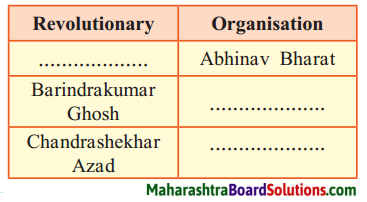
Answer:
| Revolutionary | Organisation |
| 1. Swatantryaveer Savarkar | Abhinav Bharat |
| 2. Barindrakumar Ghosh | Anushilan Samiti |
| 3. Chandrashekhar Azad | Hindustan Socialist Republican Army |
| 4. Lala Hardayal | Gadar |
3. Explain the following statements with reasons:
Question 1.
Chafekar brothers killed Rand.
Answer:
- The Plague epidemic broke out in 1897 in Pune.
- Commissioner Rand was appointed to manage the Plague epidemic.
- In course of curtailing the epidemic, he resorted to tyranny and force.
As a revenge, the Chafekar brothers Damodar and Balkrishna shot him dead on 22 June, 1897.
Question 2.
Khudiram Bose was hanged to death.
Answer:
- Anushilan Samiti worked with the objective to overthrow the British rule with armed rebellion.
- Prafulla Chaki and Khudiram Bose were the members of Anushilan Samiti.
- They planned to kill a judge named Kingsford.
- They threw a bomb at a vehicle, assuming it to be of Kingsford but the vehicle was not the one carrying him.
- However, two English women were killed in this attack Khudiram Bose was caught by the police and was hanged.
![]()
Question 3.
Bhagat Singh and Batukeshwar Dutta threw bombs in the Central Legislative Assembly.
Answer:
- The Government had introduced two bills in the Central Legislature.
- The Bills curtailed civil rights of the people.
- To protest against these bills, Bhagat Singh and Batukeshwar Dutta threw bombs in the Central Legislative Assembly.
4. Answer the following in brief:
Question 1.
Write a detail description of the attack on Chittagong Armoury.
Answer:
- Surya Sen drew a plan to attack the armoury at Chittagong.
- He and his associates raided two government armouries on the 18th April, 1930.
- They seized arms and ammunition from the two armouries.
- He took revolutionaries like Anant Singh, Ganesh Ghosh, Kalpana Datta and Pritilata Waddedar with him.
- They cut off the telephone and telegraph connections and succeeded in paralysing the communication.
Question 2.
Give information about the work of India House.
Answer:
- India House, founded by Pandit Shyamji Krishna Verma in London, was the centre of revolutionary activities outside India.
- It provided assistance to the revolutionaries staying abroad.
- It gave scholarships to the Indian students studying in England.
- Swatantryaveer Savarkar received such scholarship.
![]()
Do you Know?
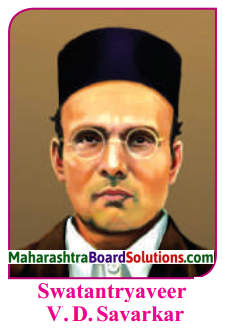
Literary and Social work of Swatantryaveer Savarkar:
- In his autobiography, ‘Majhi Janmathep’ he wrote about his experience of the terrible days in Andaman.
- After 10 years, he was taken to Ratnagiri and detained there.
- There Savarkar started many social movements such as removal of caste differences, removal of untouchability, common dining, purification of language, etc.
- In 1938, he presided over the Marathi Sahitya Sammelan at Mumbai.
- He wrote two books one The Indian War of Independence 1857′ and other biography of Joseph Mazzini, an Italian revolutionary.
Project:
Question 1.
Watch a movie or drama based on the life of revolutionaries and enact your favourite incident in the class.
Question 2.
Prepare a manual based on the saga of revolutionaries.
Class 8 History Chapter 10 Armed Revolutionary Movement Additional Important Questions and Answers
Rewrite the statements by choosing the appropriate options:
Question 1.
A youth named ………….. killed Jackson, the collector of Nashik.
Answer:
Anant Laxman Kanhere
Question 2.
Munda tribe in Bihar revolted under the leadership of ………….. .
Answer:
Birsa Munda.
![]()
Name the following:
Question 1.
Killed Rand
1. …………………………
2. …………………………
Answer:
1. Balkrishna Chafekar
2. Damodar Chafekar
Question 2.
Planned to kill Judge Kingsford and threw bomb on his vehicle
1. …………………………
2. …………………………
Answer:
1. Khudiram Bose
2. Prafulla Chaki
Question 3.
Leaders of Gadar organization
1. …………………………
2. …………………………
Answer:
1. Bhai Parmanand
2. Dr. Pandurang Sadashiv Khankhoje
![]()
Question 4.
Threw bomb in Central Legislative Assembly
1. …………………………
2. …………………………
Answer:
1. Bhagat Singh ?
2. Batukeshwar Dutta
Question 5.
Killed the District Judge
1. …………………………
2. …………………………
Answer:
1. Shanti Ghosh
2. Suniti Choudhary.
Rewrite the statements by choosing the appropriate options:
Question 1.
Vasudev Balwant Phadke took the training of arms from ………….. .
(a) Damodar Chafekar
(b) Vastad Lahuji Salve
(c) Swatantryaveer Savarkar
(d) Babarao Savarkar
Answer:
(b) Vastad Lahuji Salve
![]()
Question 2.
Anushilan Samiti’ received counsel and guidance from ……………. .
(a) Aurobindo Ghosh
(b) Barindrakumar Ghosh
(c) Khudiram Bose
(d) Rash Behari Bose
Answer:
(a) Aurobindo Ghosh
Question 3.
……………. raised the issue of India’s independence at the World Socialist Conference.
(a) Pritilata Waddedar
(b) Kalpana Dutta
(c) Madam Cama
(d) Shanti Ghosh
Answer:
(c) Madam Cama
Question 4.
……………. , a young girl shot dead the Governor during the convocation ceremony of Kolkata University.
(a) Shanti Ghosh
(b) Pritilata Waddedar
(c) Suniti Choudhary
(d) Bina Das
Answer:
(d) Bina Das
Question 5.
……………. died in an encounter with police at Alfred Park in Allahabad.
(a) Bhagat Singh
(b) Chandrashekhar Azad
(c) Madanlal Dhingra
(d) Khudiram Bose
Answer:
(b) Chandrashekhar Azad
![]()
Question 6.
In his autobiography, ……………. wrote about his experience of the terrible days in Andaman jail.
(a) Bhagat Singh
(b) Vasudev Balwant Phadke
(c) Swatantryaveer Savarkar
(d) Baba Savarkar
Answer:
(c) Swatantryaveer Savarkar
Question 7.
The Anushilan Samiti had a bomb manufacturing unit at ……………. .
(a) Kolkata
(b) Dhaka
(c) Maniktala
(d) Chittagong
Answer:
(c) Maniktala
Question 8.
The young men of Hindustan Socialist Republic were influenced by ……………. ideology.
(a) capitalistic
(b) imperialistic
(c) religious
(d) socialist
Answer:
(d) socialist
Question 9.
After the British traced the plan of revolt by Gadar Organisation ……………. escaped to Japan and continued his revolutionary work.
(a) Vishnu Shastri Pingle
(b) Khudiram Bose
(c) Rash Behari Bose
(d) Chandrashekhar Azad
Answer:
(c) Rash Behari Bose
![]()
Question 10.
……………. was the chief of revolutionary group in Bengal.
(a) Anant Singh
(b) Ganesh Ghosh
(c) Rash Behari Bose
(d) Surya Sen
Answer:
(d) Surya Sen
Identify the wrong pair, correct it and rewrite:
1. Threw bomb on Lord Hardinge – Khudiram Bose
2. Killed British officer Ash – Vanchhi Iyyer
3. Assassinated Curzon Wylie – Bhagat Singh
4. Killed Dyer in London – Sardar Udham Singh
Answer:
Wrong pair:
Assassinated Curzon Wylie – Bhagat Singh
Corrected pair:
Assassinated Curzon Wylie – Madanlal Dhingra.
Answer the following in one sentence each:
Question 1.
Who spread the network of revolutionary work outside Bengal?
Answer:
Rash Behari Bose and Sachindranath Sanyal spread the network of revolutionary organisation outside Bengal.
Question 2.
What was the objective in establishing India House?
Answer:
The revolutionary work in India received assistance from India House in London and Indian youth were given scholarships for higher education in England.
Question 3.
Who prepared anti-British plans with the help of German Foreign ministry?
Answer:
Veerendra Nath Chattopadhyay, Bhupen Dutta and Hardayal prepared anti-British plans with the help of German foreign ministry.
Question 4.
Who established Provincial Government of free India in Kabul?
Answer:
Mahendra Pratap, Barkatullah and Obaidullah Sindhi established Provincial Government of free India in Kabul.
![]()
Question 5.
What work was entrusted to a separate wing of ‘Hindustan Socialist Republican Army’?
Answer:
The work of gathering arms and execution of programmes was entrusted to a separate wing of Hindustan Socialist Republican Army.
Question 6.
How was the death of Lala Lajpat Rai avenged?
Answer:
Bhagat Singh and Rajguru fired bullets and killed officer Saunders to avenge death of Lala Lajpat Rai.
Do as Directed:
Complete the graphical presentation:
Question 1.
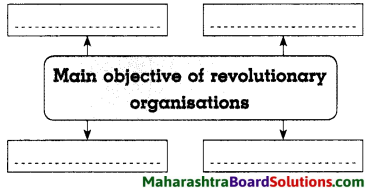
Answer:
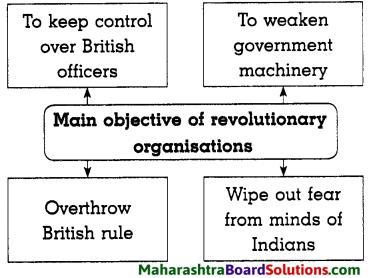
Question 2.
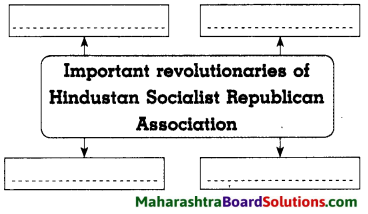
Answer:
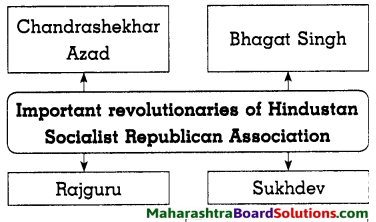
Question 3.
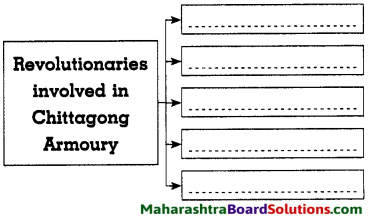
Answer:
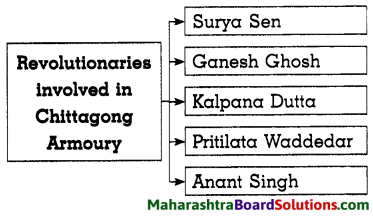
Write short notes:
Question 1.
Vasudev Balwant Phadke:
Answer:
- Vasudev Baiwant Phadke gave an armed struggle against the British in Maharashtra.
- He was of the opinion that there should be armed struggle to fight against the British.
- Vastad Lahuji Salve gave him training of arms.
- He organized Ramoshis and led armed struggle in Maharashtra, but was unsuccessful.
- He was sent to Eden Jail by the British Government where he died in 1883.
![]()
Question 2.
Literary and Social work of Swatantryaveer Savarkar:
Answer:
- When Swatantryaveer Savarkar was detained in the Ratnagiri jail, he started many social movements such as removal of caste differences, removal of untouchability, common dining, purification of language, etc.
- in his autobiography, ‘Majhi Janmathep’ he wrote about his experiences of the terrible days in Andaman where he spent ten years.
- He wrote the book ‘The Indian War of Independence 1857’ in which he stated 1857 rebellion as the first war of independence.
- He wrote an inspiring biography of Joseph Mazzini.
- Savarkar was a great writer, social worker and revolutionary.
Question 3.
Kakori Conspiracy:
Answer:
- After Gandhiji suspended Civil Disobedience, many youngsters like Chandrashekhar Azad, Ram Prasad Bismil, Yogesh Chatterjee, Sachindra Nath f Sanyal got diverted to revolutionary ways.
- On 9th August, 1925 they looted the Government treasury that was on a train near Kakori railway station in Uttar Pradesh.
- However, due to the immediate action of the government the revolutionaries were arrested and put on trial.
- Ashfaqulla Khan, Ram Prasad Bismil, Roshan Singh, Rajendra Lahiri were hanged.
- Chandrashekhar Azad managed to escape.
Explain the following statements with reasons:
Question 1.
Swatantryaveer Savarkar was sentenced to fifty years of rigorous imprisonment.
Answer:
- On knowing the activities of Abhinav Bharat, the government arrested Babarao Savarkar and sentenced to life imprisonment.
- Anant Laxman Kanhere killed Jackson, collector of Nashik in retaliation.
- The government linked Abhinav Bharat and Savarkar with his murder.
- He was arrested and put on trial. So, the court sentenced him to fifty years of rigorous imprisonment.
Question 2.
Bhagat Singh, Sukhdev and Rajguru were hanged.
Answer:
- Bhagat Singh and Batukeshwar Dutta threw a bomb in Central Legislative Assembly.
- The British Government started arresting the revolutionaries. They immediately raided the centres of ‘Hindustan Socialist Republican Army’ and got clues related to the killing of Saunders.
- Bhagat Singh, Rajguru and Sukhdev were tried under the charge of sedition.
- They were hanged in the Lahore jail on 23 March 1931.
![]()
Question 3.
Madanlal Dhingra was hanged to death.
Answer:
- India House was an important centre which provided assistance to Indian revolutionaries staying abroad.
- Madanlal Dhingra was a youth associated with India House.
- He killed Curzon Wylie, a British Officer, therefore he was hanged to death.
Answer the following in brief:
Question 1.
State the aims and objectives of the ‘Hindustan Socialist Republican Association.
Answer:
- The main objective of the Hindustan Socialist Republican Association was to free India from British exploitation.
- It also aimed at overthrowing the unjust socio-economic order which exploited the farmers and workers.
- It aimed at creation of a society based on social justice and equality.
Question 2..
Explain the work of Madam Cama.
Answer:
1. Madam Cama was related with the revolutionary work of India House.
2. She raised the issue of India’s independence at the World Socialist Conference held at Stuttgart in Germany.
3. She unfurled the flag of India at this conference.
Answer the following in detail:
Question 1.
Explain the contribution of Swatantryaveer Savarkar in the armed revolutionary movement.
Answer:
- Swatantryaveer Savarkar founded ‘Mitramela’ in 1900 at Nashik and renamed it as ‘Abhinav Bharat’ in 1904.
- He went to England for higher studies, despatched revolutionary literature, guns to the members of Abhinav Bharat in India.
- The government linked murder of Jackson to Swatantryaveer Savarkar and arrested him.
- He was put under trial. The court ordered rigorous punishment for 50 years in Andaman jail.
- His contribution is great in the armed revolution of India.
![]()
Question 2.
Give a brief account of the ‘Anushilan Samiti’.
Answer:
- After the partition of Bengal, the outrage against the British became more severe.
- In Bengal, a revolutionary organisation called ‘Anushilan Samiti’ was active.
- This organisation received counsel and guidance from Aurobindo Ghosh.
- Barindrakumar Ghosh was chief of this organisation.
- In 1908, members of Anushilan Samiti, Prafulla Chaki and Khudiram Bose made an unsuccessful attempt to kill a judge Kingsford.
- During the investigation, police got information about the work of Anushilan Samiti.
- So, the government started arresting members of Anushilan Samiti.
- The government was unsuccessful in linking Aurobindo Ghosh to the manufacturing of bombs.
- Other members were sentenced to jail for longer period.
Question 3.
Write about the activities of Gadar Organisation.
Answer:
- The Indians settled in America and Canada established the Gadar Organisation.
- The word Gadar means revolt. The objective of the organisation was to revolt against the British and free India from British rule.
- Lala Hardayal, Bhai Parmanand, Dr. Pandurang Sadashiv Khankhoje were the important revolutionaries of the organisation.
- Gadar’ Journal, the mouthpiece of the organisation voiced the evil effects of the British rule on India and published the news regarding the heroic deeds of the Indian revolutionaries.
- It conveyed the message of patriotism and armed rebellion to the Indian people.
- During the British rule, the Gadar Organisation decided to take advantage of the discontent against the British rule.
- It incited the Indian soldiers to revolt against the government.
- Rash Behari Bose and Vishnu Ganesh Pingle were entrusted the responsibility to lead the revolt.
- However, the plan could not materialise due to treachery.
- Pingle was arrested and hanged.
- Rash Behari Bose managed to escape to Japan.
Question 4.
What difference have you noted between the Moderates, Extremists and Revolutionary.
Answer:
The struggle against the British was fought in three ways. The difference in the way is as follows:
1. The moderates advocated peaceful and constitutional means. They believed in appeals and petitions. They tried to disrupt the working of the government from within. After their demands were met, they would put forth new demands. Thus, they believed in constitutional methods.
2. The approach of extremists was severe. They were of the opinion that if lakhs of people take part in the freedom movement and challenge the British government only then success could be achieved.
3. Revolutionary wanted to fight the British in armed way. According to them, there should be armed struggle against the British. They adopted methods like killing the British officers, raiding the government treasury, disrupting transport and communication, etc.
All the three ways are different but had one objective of achieving Independence for India.